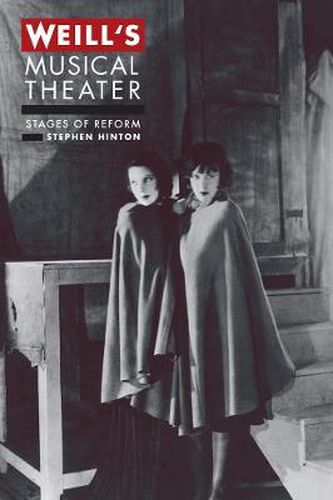Readings Newsletter
Become a Readings Member to make your shopping experience even easier.
Sign in or sign up for free!
You’re not far away from qualifying for FREE standard shipping within Australia
You’ve qualified for FREE standard shipping within Australia
The cart is loading…






In the first musicological study of Kurt Weill’s complete stage works, Stephen Hinton charts the full range of theatrical achievements by one of twentieth-century musical theater’s key figures. Hinton shows how Weill’s experiments with a range of genres-from one-act operas and plays with music to Broadway musicals and film-opera-became an indispensable part of the reforms he promoted during his brief but intense career. Confronting the divisive notion of two Weills -one European, the other American-Hinton adopts a broad and inclusive perspective, establishing criteria that allow aspects of continuity to emerge, particularly in matters of dramaturgy. Tracing his extraordinary journey as a composer, the book shows how Weill’s artistic ambitions led to his working with a remarkably heterogeneous collection of authors, such as Georg Kaiser, Bertolt Brecht, Moss Hart, Alan Jay Lerner, and Maxwell Anderson.
$9.00 standard shipping within Australia
FREE standard shipping within Australia for orders over $100.00
Express & International shipping calculated at checkout
Stock availability can be subject to change without notice. We recommend calling the shop or contacting our online team to check availability of low stock items. Please see our Shopping Online page for more details.
In the first musicological study of Kurt Weill’s complete stage works, Stephen Hinton charts the full range of theatrical achievements by one of twentieth-century musical theater’s key figures. Hinton shows how Weill’s experiments with a range of genres-from one-act operas and plays with music to Broadway musicals and film-opera-became an indispensable part of the reforms he promoted during his brief but intense career. Confronting the divisive notion of two Weills -one European, the other American-Hinton adopts a broad and inclusive perspective, establishing criteria that allow aspects of continuity to emerge, particularly in matters of dramaturgy. Tracing his extraordinary journey as a composer, the book shows how Weill’s artistic ambitions led to his working with a remarkably heterogeneous collection of authors, such as Georg Kaiser, Bertolt Brecht, Moss Hart, Alan Jay Lerner, and Maxwell Anderson.